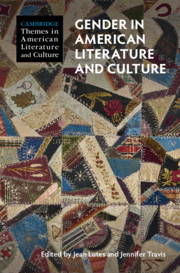Book contents
- Gender in American Literature and Culture
- Cambridge Themes in American Literature and Culture
- Gender in American Literature and Culture
- Copyright page
- Contents
- Contributors
- Acknowledgments
- Introduction
- Part I Intimacies
- Part II Aggressions
- Part III New Directions
- Chapter 15 What a Doctor Should Look Like
- Chapter 16 Genderqueer
- Chapter 17 Fanfiction, Transformative Works, and Feminist Resistance in Digital Culture
- Chapter 18 Vulnerable States
- Chapter 19 The Mahjar
- Chapter 20 Disabled Women’s Life Writing and the Problem with Recovery
- Chapter 21 Feeling, Memory, and Peoplehood in Contemporary Native Women’s Poetry
- Bibliography
- Index
Chapter 21 - Feeling, Memory, and Peoplehood in Contemporary Native Women’s Poetry
from Part III - New Directions
Published online by Cambridge University Press: 01 April 2021
- Gender in American Literature and Culture
- Cambridge Themes in American Literature and Culture
- Gender in American Literature and Culture
- Copyright page
- Contents
- Contributors
- Acknowledgments
- Introduction
- Part I Intimacies
- Part II Aggressions
- Part III New Directions
- Chapter 15 What a Doctor Should Look Like
- Chapter 16 Genderqueer
- Chapter 17 Fanfiction, Transformative Works, and Feminist Resistance in Digital Culture
- Chapter 18 Vulnerable States
- Chapter 19 The Mahjar
- Chapter 20 Disabled Women’s Life Writing and the Problem with Recovery
- Chapter 21 Feeling, Memory, and Peoplehood in Contemporary Native Women’s Poetry
- Bibliography
- Index
Summary
The existence of the US as a settler-state involves not simply the removal of Indigenous peoples from their lands but ongoing efforts to remake Indigenous home, family, and placemaking. Native authors engage and critique such colonial violence by attending to how settler domination works to reorganize patterns of everyday Indigenous life in deeply (hetero)gendered ways, and reciprocally, such writing explores networks of relation to persons, places, and non-human entities that provide the lived basis of indigeneity – networks that do not count as “political” in Euro-American terms. Through readings of poetry by Heid Erdrich (Turtle Mountain Band Ojibway), Layli Long Soldier (Oglala Lakota), and Cheryl Savageau (Abenaki), this essay explores how these writers illustrate historical and ongoing settler efforts to transform and erase ordinary forms of Indigenous feeling and relation. In turn, their writings address the ways such everyday affects are crucial to Indigenous self-determination: to the operation, well-being, and continuance of Indigenous political orders.
- Type
- Chapter
- Information
- Gender in American Literature and Culture , pp. 332 - 349Publisher: Cambridge University PressPrint publication year: 2021

